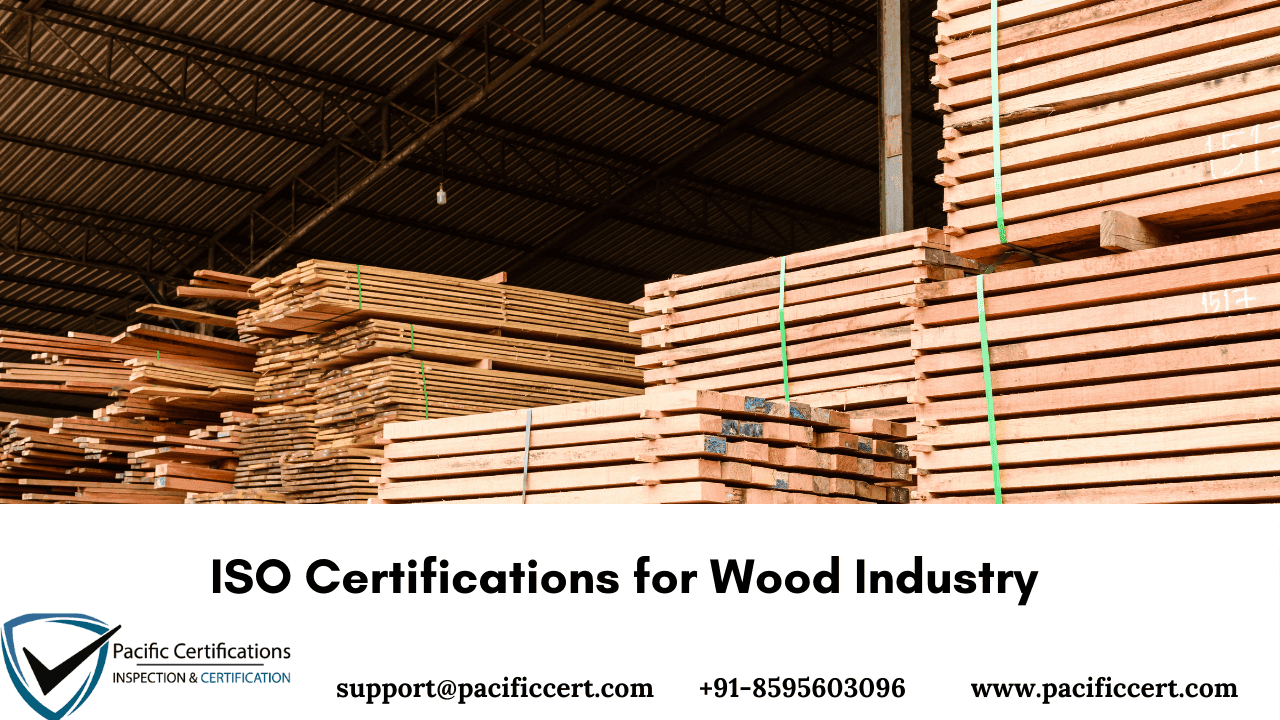ISO Certifications for Wood Industry, Requirements & Benefits

Introduction
The wood industry encompasses sawmills, timber processors, furniture manufacturers, plywood producers, and wood-based product facilities engaged in cutting, shaping, drying, treating, and finishing raw timber into finished goods. Operating environments involve high-speed machinery, combustible wood dust generation, chemical treatments, energy-intensive drying processes, and continuous material handling across complex supply chains. These businesses face critical challenges including fire and explosion hazards from airborne wood dust, occupational injuries from heavy equipment, environmental emissions from wood processing, waste management complexities, and increasingly stringent sustainability requirements.
ISO certifications provide wood industry operators with internationally recognized frameworks to systematically manage quality consistency, workplace safety, environmental responsibility, energy efficiency, and supply chain traceability. Regulatory pressures from OSHA combustible dust standards, EPA Clean Air and Clean Water Act compliance, formaldehyde emission controls, and international sustainability mandates like the EU Deforestation Regulation demand robust management systems. Wood businesses must demonstrate responsible sourcing, pollution control, worker protection, and continuous operational improvement to meet customer expectations and maintain market access.
The industry is undergoing transformation, balancing between traditional craftsmanship and advanced automation. According to Allied Market Research, the global wood manufacturing market exceeded USD 630 billion in 2024 and is projected to reach over USD 880 billion by 2030, growing at a CAGR of nearly 5.7%. Demand for certified, eco-friendly, and energy-efficient wood products is driving organizations to adopt ISO standards that ensure quality assurance, workplace safety, and environmental stewardship.
Sustainable sourcing and operational safety define competitive advantage in modern wood manufacturing
Quick Summary
ISO certifications provide wood industry businesses with internationally recognized frameworks to manage quality control through ISO 9001, occupational health and safety through ISO 45001, environmental impact through ISO 14001, energy efficiency through ISO 50001, supply chain traceability through ISO 38200, risk management through ISO 31000, and business continuity through ISO 22301.
For support, contact us at [email protected].
Applicable ISO standards for Wood Industry
Below are the most relevant ISO standards applicable to sawmills, timber processors, furniture manufacturers, plywood producers, wood treatment facilities, and wood-based product manufacturers:
ISO 9001: Quality Management System (QMS)
ISO 9001 establishes consistent quality controls across wood processing, from raw timber grading through cutting, treatment, assembly, and finished product delivery, reducing defect rates and customer complaints in furniture, plywood, lumber, and wood component manufacturing.
ISO 14001: Environmental Management System (EMS)
ISO 14001 addresses environmental impacts specific to wood operations including air emissions from drying kilns, wastewater discharge from treatment processes, solid waste generation from sawdust and offcuts, and sustainable forestry practices, ensuring compliance with EPA and international environmental regulations.
ISO 45001: Occupational Health and Safety Management System (OHSMS)
ISO 45001 mitigates critical wood industry hazards including combustible dust explosions, machinery-related injuries from saws and planers, chemical exposure from wood preservatives, noise hazards, and ergonomic risks, reducing accident frequency rates and near-miss incidents.
ISO 50001: Energy Management System (EnMS)
ISO 50001 targets energy-intensive wood processing operations including kiln drying, cutting equipment, dust collection systems, and facility climate control, reducing energy consumption per ton of processed wood and lowering operational costs.
ISO 38200: Chain of Custody of Wood and Wood-Based Products
ISO 38200 provides wood-specific traceability requirements ensuring legal sourcing and sustainable forestry verification from harvest through processing and distribution, addressing EU Deforestation Regulation and Swiss Timber Trade Ordinance compliance while supporting FSC and PEFC certification frameworks.
ISO 22301:2019 – Business Continuity Management Systems
ISO 22301 prepares wood businesses for disruptions including fire incidents, equipment failures, supply chain interruptions, and regulatory shutdowns, ensuring rapid recovery capabilities and maintaining customer delivery commitments.
ISO 24260: Machine tools for wood and plastics processing
Safety requirements - If you manufacture woodworking machinery, this standard outlines safety requirements for designing and producing such machinery.
ISO 20655: Determination of Density and Moisture Content
This standard provides guidelines for determining the density and moisture content of wood, which is essential for quality control and ensuring wood's suitability for specific applications.
Click here to find out more applicable standards to your industry
What are the requirements of ISO Certifications for Wood Industry?
Wood industry businesses seeking ISO certification must establish and maintain documented policies, procedures, and records aligned with the selected ISO standards. Key requirements include the following:
Define certification scope- from raw timber sourcing and processing to finished products and logistics.
Develop written quality and environmental policies aligned with regulatory, sustainability, and customer requirements.
Maintain documentation for product design, process control, equipment calibration, and waste management.
Conduct environmental impact assessments for logging, milling, chemical usage, and emissions control.
Implement safety procedures for machinery handling, fire prevention, and occupational hazard reduction.
Train workers on quality standards, safe equipment use, and environmental awareness.
Monitor and record non-conformities, corrective actions, and product performance metrics.
Evaluate suppliers and ensure chain-of-custody compliance for sustainable forest materials.
Schedule internal audits, management reviews, and corrective actions for continuous improvement.
For chain-of-custody standards (ISO 38200), maintain traceability documentation from forest source to final sale.
Tip: Start with ISO 9001 and ISO 14001 to establish core systems for process control and sustainability, then expand to ISO 45001 or ISO 38200 to strengthen safety and responsible sourcing.
For more information on how we can assist your wood industry business with ISO certifications, please contact us at [email protected].
What are the benefits of ISO Certifications for Wood Industry?
Obtaining an ISO certification in the wood industry can offer a range of benefits. Below are some key benefits of ISO certification for the wood industry:
ISO certifications are globally recognized and indicates that your wood industry operations meet internationally accepted standards for quality, safety, environmental management.
Implementing these standards can help you streamline processes and consistently deliver high-quality wood products.
Achieving ISO certification ensures that you're in compliance with relevant laws and regulations..
ISO certifications encourage process optimization and efficiency improvements.
ISO standards emphasize risk assessment and management.
ISO 14001 helps wood industry for sustainable sourcing of wood, waste reduction and minimizing the environmental impact of wood processing.
SO certification can set you apart from competitors in the wood industry.
ISO certification signals to customers that your wood products are manufactured or processed with attention to quality and safety.
ISO Certification can open doors to new business opportunities that might otherwise be inaccessible.
Being ISO certified can improve relationships with suppliers.
ISO standards promote a culture of continuous improvement.
The global wood and timber products market is projected to exceed USD 1,240billion in the coming years, with growth driven by construction sector expansion, sustainable building material demand, and engineered wood product adoption. Regulatory frameworks are tightening internationally, including EU Deforestation Regulation requirements for supply chain due diligence, US EPA formaldehyde emission standards for composite wood products, and OSHA combustible dust enforcement programs increasing compliance pressures.
ISO implementation in wood facilities demonstrates 20-30% reductions in workplace injury rates, significant decreases in environmental violations, and measurable improvements in energy efficiency and waste diversion performance. ISO certification is becoming a baseline requirement for international supply chains, government procurement, and commercial construction projects, while aging wood processing infrastructure and legacy safety practices drive modernization investments toward certified management systems.
How Pacific Certifications Can Help
Pacific Certifications, accredited by ABIS, acts as an independent certification body for wood industry businesses by conducting impartial audits against applicable ISO standards. Our role is to objectively assess whether documented management systems and wood processing practices conform to international ISO requirements, based strictly on verifiable evidence and operational records.
We support wood industry providers through:
Independent certification audits conducted in accordance with ISO/IEC 17021 for management system standards
Practical assessment of real wood processing operations, safety controls, environmental management, and chain of custody systems
Clear audit reporting reflecting conformity status, non-conformance findings, and certification decisions based on documented evidence
Internationally recognized ISO certification upon successful compliance demonstration
Surveillance and recertification audits to maintain certification validity throughout the three-year certification cycle
Contact us
If you need support with ISO certification for your wood industry business, contact us at [email protected] or +91-8595603096.
Author: Sony

Read more: ISO Certifications for Paper Industry-Applicable standards-Requirements and Benefits
